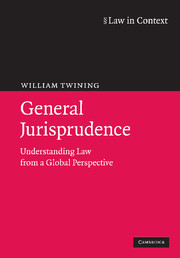Book contents
- Frontmatter
- Contents
- Preface
- Acknowledgements
- List of abbreviations
- Further abbreviations
- Part A
- 1 Jurisprudence, globalisation and the discipline of law: a new general jurisprudence
- 2 Analytical jurisprudence in a global context
- 3 Mapping law: Families, civilisations, cultures and traditions
- 4 Constructing conceptions of law: Beyond Hart, Tamanaha and Llewellyn
- 5 Normative jurisprudence, utilitarianism, and theories of justice
- 6 Human rights as moral, political and legal rights
- 7 Meeting the challenges to human rights: Griffin, Tasioulas and Sen
- 8 Empirical dimensions of law and justice
- Part B
- 14 Conclusion
- Bibliography
- Index
2 - Analytical jurisprudence in a global context
Published online by Cambridge University Press: 05 June 2012
- Frontmatter
- Contents
- Preface
- Acknowledgements
- List of abbreviations
- Further abbreviations
- Part A
- 1 Jurisprudence, globalisation and the discipline of law: a new general jurisprudence
- 2 Analytical jurisprudence in a global context
- 3 Mapping law: Families, civilisations, cultures and traditions
- 4 Constructing conceptions of law: Beyond Hart, Tamanaha and Llewellyn
- 5 Normative jurisprudence, utilitarianism, and theories of justice
- 6 Human rights as moral, political and legal rights
- 7 Meeting the challenges to human rights: Griffin, Tasioulas and Sen
- 8 Empirical dimensions of law and justice
- Part B
- 14 Conclusion
- Bibliography
- Index
Summary
Introduction: conceptual questions
What is law?
What should count as a ‘legal system’ or ‘legal order’ for the purpose of constructing a reasonably comprehensive historical atlas of law in the world?
Does Hart's (or Kelsen's or Dworkin's) conception of law travel well?
Does the European Union have a constitution? Should it have one?
We are told that legal pluralism occurs when two or more legal orders co-exist in the same time-space context. What counts as one ‘legal order’?
Do ‘rights’ have the same meaning in Islamic law and Western law?
Can corporations have human rights? Can chimpanzees?
Was Dinka traditional society genuinely democratic?
To what extent does the interpretation of the precise scope of ‘inhuman and degrading treatment’ turn on universal moral principles or local culture and conditions?
Is ‘dignity’ in the Universal Declaration of Human Rights so vague as to be meaningless?
Transparency International, Western financial institutions (e.g. the World Bank) and aid agencies are promoting a worldwide campaign against corruption. Transparency International regularly publishes a Corruption Perceptions Index in the form of league tables. Is not what counts as ‘corruption’ culture specific?
Is cronyism a form of corruption? When is a tip a bribe?
What is meant by ‘development’? How can it be measured?
What is the essential nature of globalisation?
Mrs Thatcher said ‘There is no such thing as society’; several social scientists have argued that ‘society’ is no longer a useful concept. Are they in agreement?
- Type
- Chapter
- Information
- General JurisprudenceUnderstanding Law from a Global Perspective, pp. 32 - 62Publisher: Cambridge University PressPrint publication year: 2009

